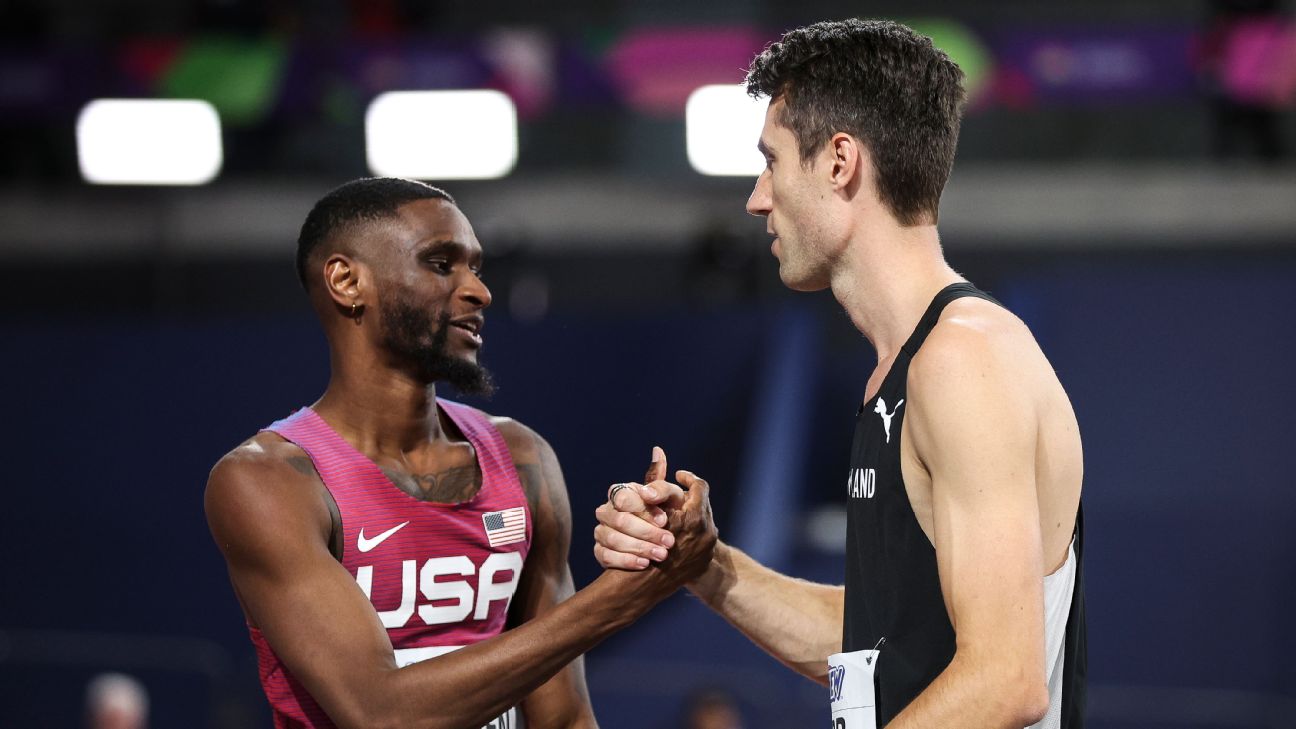
First they put the bar up higher. Then they lowered it.
Wherever they put the bar, American Shelby McEwen and world indoor champion Hamish Kerr of New Zealand couldn’t clear it. The two high jumpers, who could have decided to tie and both get a gold medal, instead put fans through an interminable jump-off for the gold at the Paris Olympics on Saturday.
The two men had 11 straight misses — so many that there wasn’t enough room on the scoreboard for all the Xs — in regulation and the jump-off. The bar was lowered twice during the jump-off, and Kerr finally broke the streak of failures when he got over 2.34 meters (7 feet, 8 inches) to take the gold.
“To do it the way I did it was just amazing,” Kerr said. “It was crazy.”
McEwen was left with the silver, both he and Kerr having cleared 2.36 meters (7 feet, 8.75 inches).
Going into the final day of the Olympics, China led the U.S. in gold medals 39 to 38. If McEwen accepted a tie for gold, the two superpowers would be even.
At the Tokyo Olympics, a similar scenario played out and Mutaz Barshim of Qatar and Gianmarco Tamberi of Italy decided to accept the tie.
Barshim took the bronze Saturday at 2.34. Tamberi was eliminated early on.
“I have so much respect for what they did in Tokyo. But I always thought that to add to the story and to be able to be given the chance to actually do the jump-off would be so amazing,” Kerr said. “I knew straight away that we were going to make history and we did that.
“I’m pretty sure Shelby was in the same mindset because we just looked at each other and it was pretty simple,” Kerr added. “We both just nodded and off we went.”
McEwen added, “We talked to each other, and he was like, ‘Let’s jump off.’ And I was like, ‘I’m all for it.'”
Kerr celebrated by running around the field in the center of the Stade de France deliriously.
They both missed at 2.38 in the first round of the jump-off, another two misses at 2.36 and McEwen missed at 2.34 before Kerr finally ended the first competition of the night only moments before the women’s 4×400 relay concluded the last session of track and field at the Stade de France.
“If I hadn’t cleared that jump or one very soon, we probably still would be out there,” Kerr said.
McEwen said he thought “we both got a little fatigued there at the end,” adding that he was thinking about the $50,000 prize for first place. “Most definitely, I got a family to feed. But, hey, we’re going to get back to the drawing boards and get better.”
Earlier, Tamberi failed on all three of his attempts at 2.27 — only the second height of the competition. He covered his face with his hands in disappointment and then Barshim came over to console his good friend.
Tamberi had been bothered by a series of physical issues over the past few days. He was hospitalized with kidney stones and had a fever of 38.8 Celsius (101.8 Fahrenheit). But he vowed to compete no matter what.
When it was over, and Tamberi had finished 11th in the 12-man final, he went over and cried with his team in the stands.
In women’s javelin, Haruka Kitaguchi crushed it, taking the top of the podium with her first throw of 65.80 meters to give Japan its first gold medal in the event.
South Africa’s Jo-Ane van Dyk and Czechia’s Nikola Ogrodnikova gave a series of valiant efforts but never came close as they took silver and bronze, respectively, with their best throws of 63.93 and 63.68.
Last year, Kitaguchi needed her final throw to take the world gold in Budapest, but she left little suspense at the Stade de France as she opened with her best throw of the season.
Ogrodnikova briefly had control of second place with her third throw, but van Dyk overtook her immediately.
With the gold already wrapped up, Kitaguchi bounced nervously at the end of the runway and kept a poker face as she launched a final bonus effort. The emotion came quickly thereafter, as she burst into tears and hugged her team with the Japanese flag draped over her before ringing the victory bell.
The Associated Press and Reuters contributed to this report.
